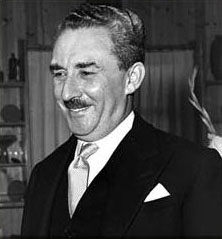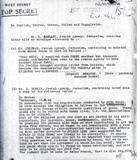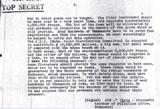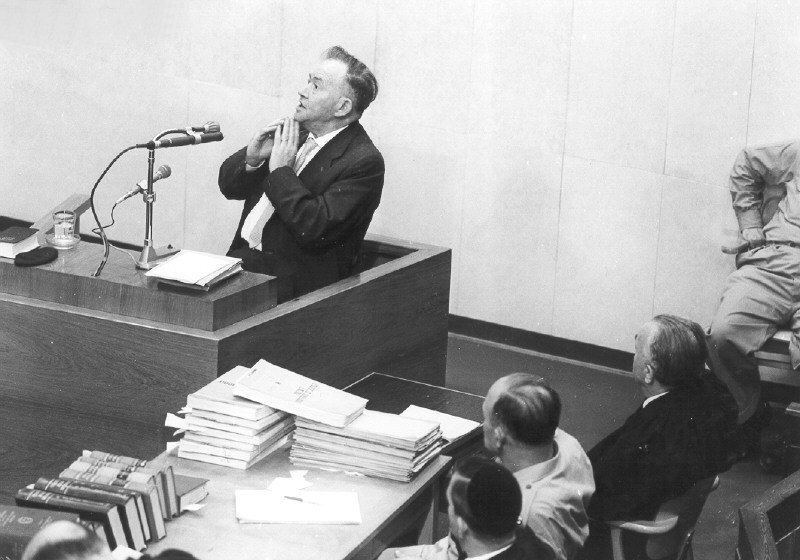Holocaust Education & Archive Research Team |
|
Occupation German Occupation of Europe Timeline
-
[The Occupied Nations]
Poland Austria Belgium Bulgaria Denmark France Germany Greece Hungary Italy Luxembourg The Netherlands Norway Romania Slovakia Soviet Union Sudetenland | ||||
Joel Brand "Blood for Goods"
Joel Brand was born in Nasaud Transylvania in 1907, which was under Hungarian rule. Brand embraced Zionism after a spell in the radical leftist movement in Weimar Germany.
He returned to Transylvania after Hitler came to power but eventually settled in Budapest, where together with his wife, Hansi Hartmann- Brand, he operated a medium –sized glove manufacturing plant.
After the German annexation of Austria in 1938 and the outbreak of the Second World War in September 1939 the Brands took an interest in refugee causes, and took an active part organising a variety of rescue and relief ventures.
When the Va’ada was established in January 1943 to aid refugees who had escaped from or were seeking to escape from Slovakia and Poland, Brand was chosen to head its Tiyyul (Trip) section, a border crossing operation, whose function was to smuggle Jews out of these countries.
After the German occupation of Hungary on the 19 March 1944, the Va’ada’s primary concern was the rescuing of Jews within Hungary. Brand was also engaged in the Re-Tiyyul (Return Trip) programme, which enabled a number of Polish and Slovak refugees to return to Slovakia where the situation of the remaining Jews was better, for the moment.
While the first contact and rescue negotiations with the SS were established through Fulop Freudiger, the Orthodox representative of the Jewish Council Zsido Tanacs, and continued later by Rezso Kastner, it was Brand whom Adolf Eichmann summoned on the 25 April 1944, to offer his “Blood for Goods” proposal.
Brand met Eichmann in the Majestic Hotel in Budapest. Eichmann greeted Brand with the following words:
“Do you know who I am?
I have carried out the Aktionen in the Reich – in Poland – in Czechoslovakia. Now it’s Hungary’s turn. I let you come here to talk business with you. Before that I investigated you – and your people.
Those from the Joint and those from the Agency, and I have come to the conclusion that you still have resources. So I am ready to sell you – a million Jews.
All of them I wouldn’t sell you. That much money and goods you don’t have. But a million – that will go. Goods for blood – blood for goods. You can gather up the million in countries which still have Jews.
You can take it from Hungary, from Poland, from Austria, from Theresienstadt, from Auschwitz, from wherever, you want.
What do you want to save? Virile men? Grown women? Old people? Children? Sit down and talk.”
This proposal which had been approved by Heinrich Himmler, Reichsfuhrer SS, was to exchange one million Jews for certain goods, such as 10,000 trucks to be used on the Eastern front, or for civilian purposes.
The Jews could not remain in Hungary, as Himmler had promised to make Hungary Judenfrei (free of Jews), so those covered by this proposal would be permitted to go into any Allied-controlled part of the world, except Palestine, for the Nazis had promised the mufti of Jerusalem, Hajj Amin al –Husseini, not to allow this.
To ensure the proposal was set in motion Eichmann was prepared to let Joel Brand to present this to the Allies, and the representatives of world Jewry. The real reason why Eichmann selected Brand remains a mystery, but Joel Brand was probably recommended to Eichmann by Andor (“Bandi”) Grosz.
Grosz was a doubtful character and minor intelligence agent, who was in the service of anyone who paid him, including the Germans and the Va’ada. He was reportedly in the pay of SS-Hauptsturmfuhrer Otto Klages, the head of the Sicherheitsdienst (SD) in Hungary.
Grosz was assigned to accompany Brand to establish contact with American and British intelligence officers in Istanbul and to discuss with them the possibility of a separate peace deal between Germany and the Western Allies. The mission of Joel Brand was to act as a camouflage screen for Grosz’s more important assignment.
At the beginning of May 1944 Eichmann held a conference to discuss the transportation arrangements for the Jews of Hungary to Auschwitz death camp, he then renewed contact with Brand on the 5 May to pursue the Nazi proposal.
Brand was informed about the completion of his travel arrangements on the 15 May 1944, the very day that mass deportations from Hungary commenced. He was supplied with a German passport bearing the name Eugen Band, he left Budapest for Vienna in the company of Obersturmbannfuhrer Hermann Krumey, a leading member of the Eichmann Sonderkommando, while Andor Grosz left two days later.
On the 19 May 1944 Brand and Grosz arrived in Istanbul, where they were met , by local representatives of the Joint Rescue Committee of the Jewish Agency.
Brand did not possess a visa for Turkey, the details of his mission was revealed to Laurence Steinhardt, the American ambassador in Ankara and to the leaders of the Jewish Agency in Jerusalem, by the Agency’s representatives based in Turkey.
By the end of May 1944, the leaders of the British and American governments were fully aware of the Brand and Grosz mission. Grosz was arrested by British forces on the 1 June, shortly after crossing the Syrian border. Thus he was unable to meet with authorised Jewish and non-Jewish representatives and to fulfil his assignment.
Brand now equipped with a British visa Brand left for Palestine on the 5 June 1944, but was arrested by the British at Aleppo on the 7 June 1944. On the 10 June 1944, while under arrest, he was able to reveal the plight of Hungarian Jewry under the Nazis, and Eichmann’s proposal to Moshe Sharrett, head of the Jewish Agency’s Political Department.
Meanwhile, back in Hungary Eichmann was under no illusions, as to the likely outcome of Brand’s mission. On the 9 June 1944 Eichmann told Kastner, “that if he did not receive an answer from Brand in three days, he would let the mills grind at Auschwitz.”
Moshe Sharett and Ira A. Hirschmann, of the War Refugee Board who subsequently interviewed Joel Brand, were both impressed by him. Immediately they informed top Jewish Leaders in the Yishuv and to leading members of the American and British governments.
In spite of the pleas by the Yishuv leaders, the British government decided against having any dealings with the Gestapo and they refused to let Brand return to Hungary. Their decision was partly based on concerns over German attempts to split the Allies, Soviet concerns and the concern over the responsibility of acquiring one million Jews, if the Nazis kept their part of the bargain. The American government hoped that negotiations could continue, in the hope of saving more Jews from the gas chambers at Auschwitz.
On the 19 July 1944 the BBC made public the Nazi proposal and the following day the British press heralded that the “monstrous offer” was a loathsome attempt to blackmail the Allies, and any hopes the Jewish leaders had of saving lives was shattered. The London Times on the 20 July 1944 reflected the Governments attitude;
“It has long been clear that, faced with the certainty of defeat, the German authorities would intensify all their efforts to blackmail, deceive and split the Allies. In their latest effort, made known in London yesterday, they have reached a new level of fantasy and self-deception.”
Immediately after his 10 June meeting with Sharrett, Brand was taken to Cairo, where he was held as a “privileged prisoner” until October 1944 when he was allowed to leave for Palestine.
Joel Brand was a bitter and dejected man, Brand was convinced that because of shortcomings of the Jewish leaders and the actions of the Allied governments the chance to save a million Jews had been squandered.
Joel Brand testified at Adolf Eichmann’s trial in Jerusalem and he died in Tel Aviv on the 13 July 1964.
Sources:
The United States National Archives College Park - Washington D.C Encyclopaedia of the Holocaust Eichmann Trial Transcripts Nizkor The Destruction of the European Jews by Raul Hilberg, published by Holmes and Meier New York 1985 The Final Solution by Gerald Reitlinger published by Sphere Books 1971 Private collections
Copyright Chris Webb & Rachael Stein H.E.A.R.T 2009 | ||||

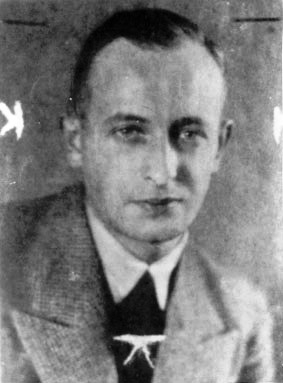

%20of%20Hungary%20for%20his%20mission%20to%20Mandate%20Palestine%20in%20an%20attempt%20to%20rescue%20Hungarian%20Jewry..jpg)
